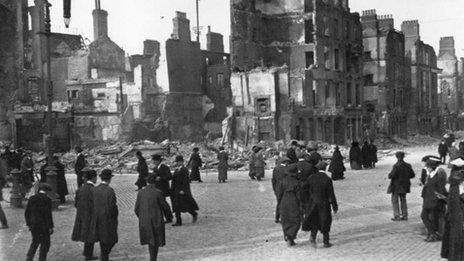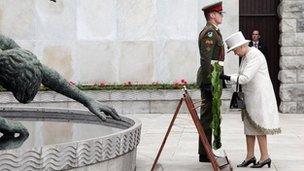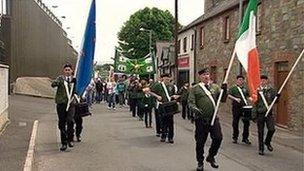1916 Rising centenary: Royal representative to be invited
- Published

The 1916 Easter Rising is to be commemorated by a series of events in Dublin in three years time
Representatives of the Royal Family, UK government and unionism will be invited to Irish ceremonies marking the Easter Rising centenary in three years' time.
The 1916 event saw rebels take over a number of buildings in Dublin as part of an uprising against British rule.
British troops put down the rebellion and many ringleaders were executed.
Announcing the invitation, the Irish foreign minister urged nationalist and unionist communities to honour history without antagonising their neighbours.
Eamon Gilmore, who is also the Republic of Ireland's deputy prime minister (Tánaiste), made the remarks in a speech to the British Irish Association in Cambridge on Saturday.
During his address, he criticised a recent republican parade in County Tyrone and said he was "concerned at the way in which the past is exercising a corrosive effect on political life and on community relations" in Northern Ireland.
'Mutual respect'

In 2011, the Queen laid a wreath in a garden dedicated to Irishmen who fought for independence
Mr Gilmore said people have "a responsibility to prepare and carry out our commemorations in a way that gives no offence and is mindful of the sensitivities of all citizens".
"I don't underestimate the challenges this will involve but I know they are surmountable, especially if we take our lead from the gracious and mutual respect shown by Queen Elizabeth and President McAleese in Dublin two years ago," the tánaiste added.
In May 2011, the Queen made her first visit to the Republic of Ireland, during which she laid a wreath at Dublin's Garden of Remembrance, dedicated to those who fought for Irish freedom.
The four-day state visit, hosted by the then Irish President Mary McAleese, was hailed as a diplomatic triumph that improved Anglo-Irish relations.
Mr Gilmore told the British Irish Association: "If we are true to the lead that they showed, then I would hope that we can host representatives of the Royal Family and the British government, along with the leaders of unionism, in Dublin in three years' time in remembering the Easter Rising.
"I hope also that three months later we can all respectfully remember those who gave their lives in British uniform at the battle of the Somme."
IRA memorial
The tánaiste said he intended to visit Belfast for the second year in a row to lay a Remembrance Day wreath in honour of Irish men who died in the First World War, "including those who fought to maintain the union".

Eamon Gilmore criticised republicans over last month's memorial parade in Castlederg
During his speech, Mr Gilmore was critical of republicans who organised a memorial parade in Castlederg last month, during which two IRA bombers were honoured.
He said they were entitled to remember republicans who died in the Troubles, but said he disagreed with "the way they did so this year".
"Their entitlement is tempered by responsibility to respect and be sensitive to the suffering of victims of the Troubles. I saw little of that respect or sensitivity in Castlederg last month."
The foreign minister added that during his trip to Belfast last week, he met community leaders working in sectarian interface area who were "under extreme pressure after a full year of almost continuous tensions".
Mr Gilmore said the message he got from the people he spoke to was that they "fear a return of sectarian violence" and the loss of progress that had been gained in the 15 years since the signing of the Good Friday Agreement.
'Hopeful'
Police in Northern Ireland have come under pressure, and sometimes under physical attack, during a number of contentious parades this year, and at street protests linked to the dispute over the flying of the union flag at Belfast City Hall.
"I am concerned at the pervasive and undiminished influence of sectarianism on civil life - and not solely in the more deprived communities," the tánaiste said.
However, Mr Gilmore told the British Irish Association that he remained "hopeful" that problems could be resolved, with support from the British and Irish governments, the US administration and European peace funding.
He said forthcoming talks, to be chaired by US envoy Richard Haass, must produce "a clear way forward on all of the contentious issues - flags, parades, and the past".
- Published6 September 2013
- Published7 December 2011
- Published20 May 2011